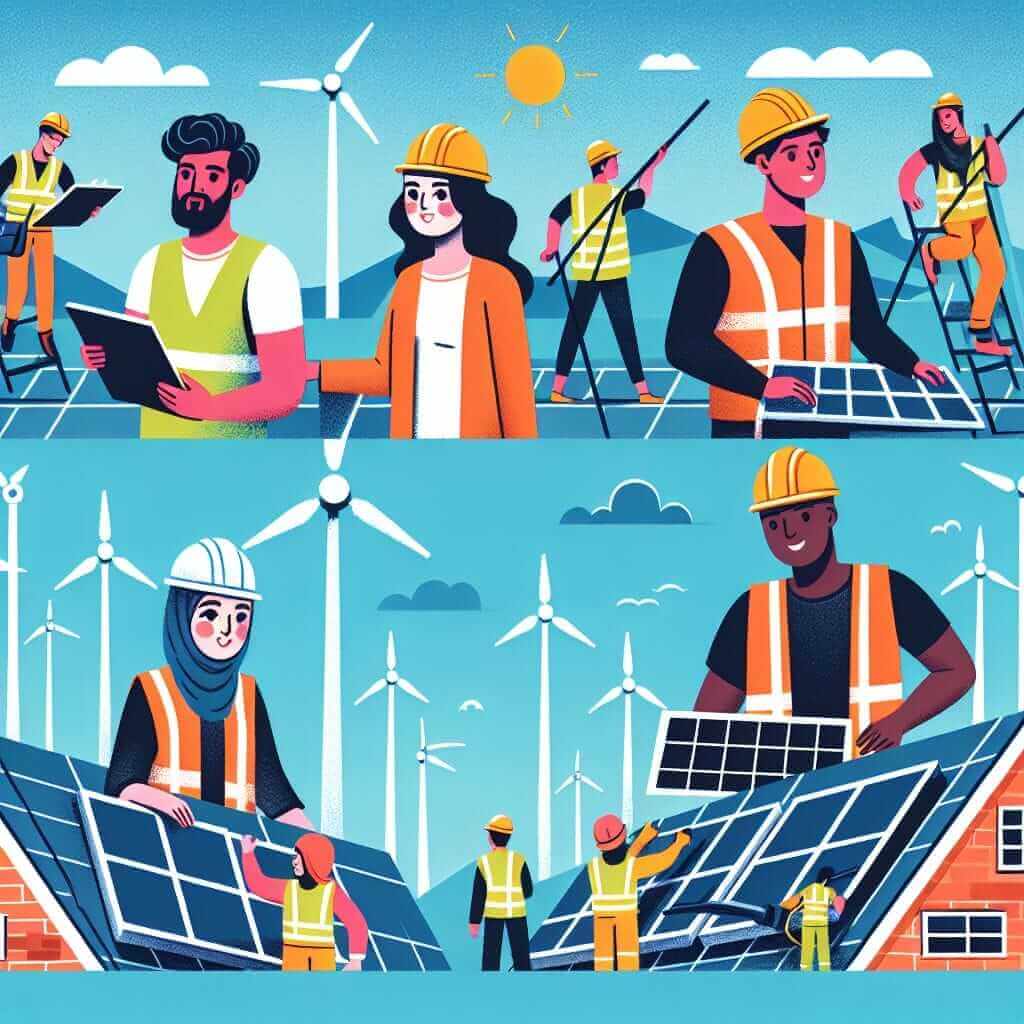The IELTS Reading test evaluates a candidate’s ability to comprehend written English in various contexts. The test is comprised of three sections, each with increasing difficulty and different text types, such as descriptive, factual, and analytical passages. A recurring theme in these passages is the analysis of economic impacts and sustainability. One topical keyword that has been the subject of much discussion is the “Economic impacts of renewable energy investments on local economies.” With the world shifting towards sustainable energy sources, this topic is likely to appear in future tests due to its global relevance and frequent occurrence in academic discussions.
This article will provide a sample IELTS Reading passage on the economic impacts of renewable energy investments on local economies, complete with questions and detailed answers. Additionally, it will delve into common errors, key vocabulary, and grammatical structures pertinent to the topic, offering valuable insights for those preparing for the IELTS exam.
Sample Reading Passage
Renewable Energy Investments: Economic Impacts on Local Economies
Recent years have witnessed a rapid proliferation of renewable energy projects across the globe. This trend not only signifies a shift towards sustainable energy sources but also heralds significant economic repercussions for local economies. Renewable energy investments catalyze numerous economic benefits, including job creation, industry growth, and enhanced energy security.
One of the most pronounced economic impacts of renewable energy investments is job creation. According to the International Renewable Energy Agency (IRENA), the renewable energy sector employed over 11 million people worldwide in 2018, a number that has steadily increased. Solar, wind, and bioenergy sectors are particularly labor-intensive, generating substantial employment opportunities in manufacturing, installation, and maintenance. These jobs not only provide direct employment but also stimulate ancillary activities, fostering a robust local economy.

Furthermore, renewable energy projects drive industrial diversification and growth. Regions traditionally dependent on fossil fuels can pivot towards renewable energy, thereby diversifying their industrial base. This diversification not only reduces economic vulnerability but also enhances the resilience of local economies against global energy price fluctuations. The presence of renewable energy industries attracts complementary businesses, creating a synergy that fuels further economic development.
Enhanced energy security represents another significant benefit of renewable energy investments. Local production of renewable energy reduces reliance on imported fuels, mitigating risks associated with global supply disruptions and price volatility. This self-sufficiency in energy production translates to cost savings for local economies, freeing up resources for other developmental initiatives.
However, the economic impacts of renewable energy investments are not universally positive. The transition towards renewable energy can lead to the obsolescence of existing industries, challenging local economies that are heavily reliant on fossil fuels. Moreover, the initial capital required for renewable energy projects is substantial, and not all regions have the financial capacity to undertake such investments without external support.
In conclusion, while renewable energy investments present numerous economic benefits, the overall impact on local economies varies. Job creation, industrial growth, and enhanced energy security are significant advantages, but challenges such as industry obsolescence and financial constraints must be addressed. As the world continues to embrace renewable energy, understanding its multifaceted economic impacts remains crucial.
Sample Questions and Answers
Questions
Multiple Choice
-
What is one of the major economic benefits of renewable energy investments?
A. Reducing global energy prices
B. Job creation
C. Decreasing energy production
D. Increasing fossil fuel dependency -
Which sector is mentioned as particularly labor-intensive within renewable energy?
A. Hydropower
B. Geothermal energy
C. Bioenergy
D. Nuclear energy
Identifying Information (True/False/Not Given)
- Renewable energy projects have no significant impact on job creation.
- Fossil fuel-dependent regions can benefit from industrial diversification through renewable energy investments.
- All local economies have the financial capacity to invest in renewable energy projects.
Matching Information
-
Match the statements with the correct paragraph (A-F):
- Job creation benefits of renewable energy investments
- The importance of energy security
- Challenges associated with renewable energy investments
Answers
Multiple Choice
- B. Job creation
- C. Bioenergy
Identifying Information (True/False/Not Given)
- False
- True
- Not Given
Matching Information
-
- Job creation benefits of renewable energy investments: Paragraph 2
- The importance of energy security: Paragraph 4
- Challenges associated with renewable energy investments: Paragraph 5
Common Errors in IELTS Reading
- Misinterpretation of Questions: Many candidates misinterpret the question, leading to incorrect answers. Always read the questions carefully.
- Skimming and Scanning Errors: Ineffective skimming and scanning often lead to missed key details. Practice these skills to improve accuracy.
- Time Management: Spend too much time on difficult questions may lead to insufficient time for easier ones. Prioritize and manage your time effectively.
Key Vocabulary
- Proliferation (n): /ˌprəʊlɪfəˈreɪʃn/ – rapid increase
- Catalyze (v): /ˈkætəlaɪz/ – to cause or accelerate a reaction
- Ancillary (adj): /ænˈsɪləri/ – providing necessary support
- Diversification (n): /daɪˌvɜːsɪfɪˈkeɪʃn/ – the process of varying range of products
Grammatical Structures
-
Relative Clauses:
- Example: “Renewable energy investments, which catalyze numerous economic benefits, are essential.”
- Use them to add extra information about a noun.
-
Passive Voice:
- Example: “The renewable energy sector is expected to grow significantly.”
- Useful for emphasizing the action or result rather than the doer.
Advice for High IELTS Reading Scores
- Practice Regularly: Regular practice with diverse reading materials will improve your comprehension skills.
- Develop Vocabulary: A strong vocabulary helps in understanding complex texts and answering questions accurately.
- Time Management: Allocate your time wisely and ensure you attempt all questions.
- Understand Question Types: Familiarize yourself with different question types to enhance your ability to locate answers quickly.